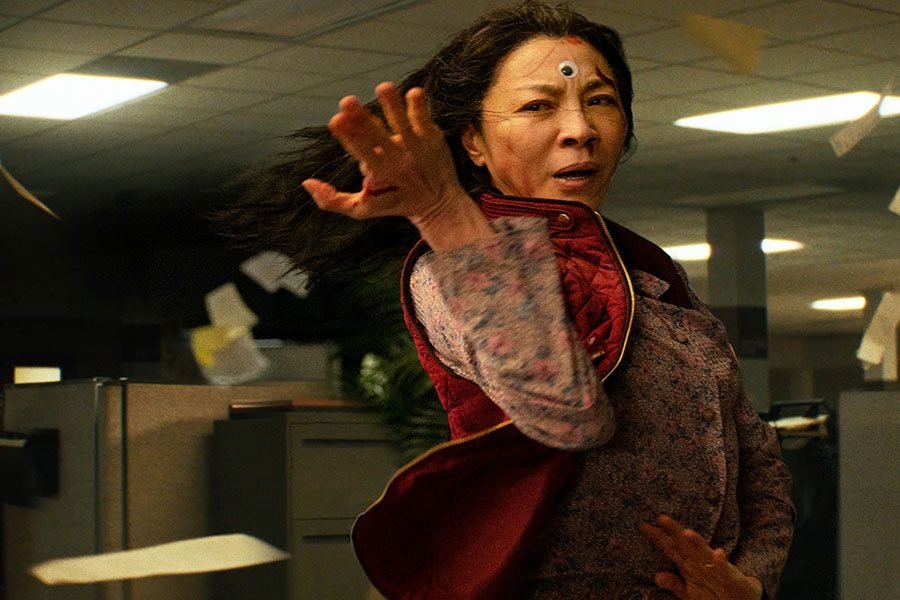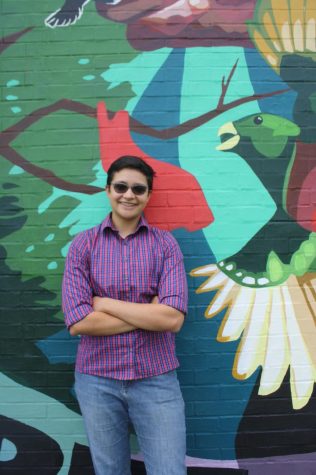Everything Everywhere All At Once checks all the boxes
The movie utilizes the multiverse and elements of magical realism to ask questions that every person wonders, such as who would you be if you had made a different decision at a specific point in your life? At the same time, the movie is unique in its ability to tell this story through the eyes of a middle-aged immigrant Chinese American woman, a demographic that almost never gets to be the protagonist of any story.
May 16, 2022
A24’s new film Everything Everywhere All At Once is an absolute must-see. Summarizing the genre-bending movie is an extremely difficult task and it is almost better to not know too much before watching it. In EEAAO, Evelyn Wang (Michelle Yeoh) works to save the laundromat that she runs, keep her family together, sort through taxes, and apparently is in charge of saving the entire multiverse. The movie utilizes the multiverse and elements of magical realism to ask questions that every person wonders, such as who would you be if you had made a different decision at a specific point in your life? The eccentricism of the film is grounded by the universal moral quandaries and questions it presents.
At the same time, the movie is unique in its ability to tell this story through the eyes of a middle-aged immigrant Chinese American woman, a demographic that almost never gets to be the protagonist of any story. “It was such a relief and a joy to think, My God, I believe that they wrote it for me because it’s encompassing all of the things that I’ve been dying to do, wanting to do, grieving to do,” said Michelle Yeoh in a recent interview with Refinery29. Even as one of the most famous modern Asian American actresses, she is still often regulated to playing side characters. In EEAAO she shines, playing a seemingly everyday woman discovering a multitude of versions of herself.
Yeoh’s acting in the main role enhanced the movie, adding layers of complexities and creating realistic, human characters. Hearing Evelyn and her husband Waymond speak in a fusion of Mandarin, Cantonese, and English and switch even in the middle of sentences was revolutionary. For many first or second generation Asians this was a familiar scene in their own lives, but for others it may have been their first time seeing this.
The film’s ability to naturally portray an immigrant Asian American experience in a universally accessible way is groundbreaking, if only because there are not enough examples of that in Western media. That is not to say that media can’t or even should be watered down or catered towards a universal audience, but EEAAO manages not to make it feel that way.
The intricate relationship between Evelyn and her second generation daughter, Joy is also explored extensively throughout the film. Evelyn has her own strained relationship with her father who disowned her when she eloped with Waymond when she was young. She has worked hard to reconnect and reconcile with him, but over the course of the film in nearly all of their interactions he makes a belittling comment towards her. You can see the weight of his expectations slowly crush her as she tries over and over to reach his unattainable standards. Perhaps unintentionally she places the same weight on her own daughter.
This is also intertwined with her acceptance of her daughter’s sexuality, yet unwillingness to introduce Joy’s girlfriend to Evelyn’s father. It begs the question, is that for her daughter’s sake or her own? She is too afraid to put her newly rekindled relationship with her father on the line, driving her daughter away. This is just one example of how the intergenerational trauma and expectations manifest.
Joy is stuck in a position of trying to be true to her own identity and trying to fit her family’s expectations, which leads to a lose-lose situation. She can never fully fit into either one and it is isolating. In the end Evelyn is forced to make a decision, do to her daughter what was done to her, or let her go. For queer Asian American women, this film hit (un)comfortably close to home.
In addition, the movie portrays masculinity in a healthy, radical way. Near the beginning of the film Waymond is seen as very passive, a pushover compared to his wife. This is often a stereotype that Asian men fall into, they are portrayed as meek and easily overpowered by strict Asian women; they are rarely portrayed as heroes or action characters in mainstream Western media, although recent films like Shang-Chi and the Legend of the Ten Rings have fought against this idea.
Everything Everywhere All at Once further works against this stereotype by showing Alpha Waymond, who is a Waymond from another universe, as a badass fighter. He fights off the bad guys in overly dramatic fight scenes with his fanny pack. However, it doesn’t just reduce Waymond to a two dimensional character.
Instead in a brilliant directorial move it actually shows that his true strength comes from his kindness and manages to walk the fine line without feeling trite and cliché. Waymond reminds his family, and the audience, that his kindness is what makes him strong and that is how he fights. In the climatic moment, Waymond’s kindness and Evelyn’s choice to accept her daughter even if Joy doesn’t perfectly fit her expectations save the day, and the multiverse.
Everything Everywhere All At Once is the best film I have seen in a long, long time. So stop reading this review, and go watch it!






